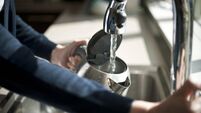Leaving Cert Results - What’s next for the Class of 2025

The Leaving Cert class of 2025 will receive their results this Friday.
On Friday, 22nd August 2025, thousands of young people across Ireland will finally open their Leaving Certificate results. For many, it will be a day of celebration; for others, it may bring anxiety or disappointment. Regardless of the results, it is important to remember that there are many pathways forward into further education, training, or employment and one should not panic if they do not receive their preferred choice or offer.
The main options available are:
The CAO System For those who have applied through the CAO system, the first round of offers will be released on Wednesday, 27th August at 2pm. If a student has applied for Level 8 courses and Level 7/6 courses, they will receive two offers, one at each level subject to meeting entry requirements for individual courses and having the required points.
• Round 1 offers will be available on Wednesday, 27th August at 2pm.
• Round 1 closing date is Tuesday, 2nd September at 3pm.
• Round 2 offers follow on Monday, 8th September at 2pm, with further rounds continuing through September.
• Round 2 closing date is Wednesday, 10th September at 3pm.
• Remember, you can only accept one offer per round, but accepting a round 1 offer does not stop you being offered a higher preference in later rounds.
• If you do not receive an offer, you may still apply for Available/Vacant Places through CAO from Thursday 28th August at 12pm.
• New courses advertised over the summer such as the Masters of Pharmacy (MPharm) course in ATU Sligo (AU975) and the new Bachelor of Science in General Nursing in MU Maynooth (MH701) are options available to students via the “Available Places” section on CAO.

Apprenticeships allow students to earn while they learn, combining paid on-the-job training with college-based learning. They are proving to be a very popular choice for young people graduating from school due to the diverse range of apprenticeships now available nationwide.
• Available in traditional trades like plumbing, electrical and hairdressing, but also in newer areas such as finance, IT, hospitality, and healthcare.
• Apprentices earn a salary while training, reducing the financial burden of further study.
• Provide a clear career pathway with strong employment prospects after completion.
• Many apprenticeships are linked to industries experiencing high demand for skilled workers, ensuring strong job security.
• Enable students to build valuable work experience and industry contacts from the start of their careers.
For further information see www.apprenticeship.ie or liaise directly with potential employers.
PLCs, offered in Further Education Colleges nationwide, are a stepping stone to work or higher education. Students engage with PLC courses if they do not achieve points or requirements needed for a particular higher education course. Other students who do achieve entry requirements for their chosen college course decide to embark on a Post-Leaving Certificate course of study as a means of ascertaining if their preferred college course is definitely for them. If one is unsure about signing up for a three-to-four-year degree course, a PLC offers an additional year for further career exploration without huge commitment or financial outlay.
• Typically, one-year courses at Level 5 or Level 6.
• Provide practical skills and can link directly into degree programmes via QQI-FET Progression Routes. One can progress to higher education colleges and universities on successful completion of their PLC course.
• Worth considering if you want more time to explore interests, gain qualifications, or prepare for college life.
• Generally, a student will study for a PLC closer to home and fees associated with these course are significantly lower than progressing to a higher-level education institute.
• Places are allocated on a first come first served basis or until places on a particular course reach maximum capacity, so early application is advised. Applications are made directly with the PLC college your local ETB and fetchcourses.ie
A newer option, these degrees start in your local Further Education College and progress to partner universities or technological universities.
• Ideal for students who prefer smaller classes initially.
• Offer recognised degree qualifications outside of the traditional CAO route.
• While these courses commence in a local further education college, there is a DEFINITE pathway to higher education in the following year. You can achieve the career you want without the pressure of needing significant Leaving Certificate points to do so.
• Moving from Further Education to Higher Education will feel seamless, with courses designed together, teachers working side by side, and students sharing the same learning spaces and experiences.
For more information see www.nto.ie

Many Irish students now pursue educational opportunities in Europe and the UK, especially for competitive areas like Medicine, Veterinary Medicine, Pharmacy, and Physiotherapy.
• Entry requirements can be lower than in Ireland.
• Degrees are widely recognised within the EU.
• Students should research carefully: tuition fees, cost of living, and professional recognition.
For more information, please see www.eunicas.ie and www.medicalpoland.ie
Sometimes students decide to delay starting college for a year. This is called a deferment. If you’re thinking of deferring, here’s what you need to do:
Wait until you get your CAO offer.
You can only defer once you’ve been officially offered the course.
Please don’t accept the offer on your CAO account.
If you accept it, you won’t be able to defer.
Contact the college admissions office straight away.
Send them an email or letter explaining that you’d like to defer and follow the instructions they give you. Each college has its own rules.
Reapply to the CAO next year:
- Complete a CAO application again by 1st February.
- Put your deferred course down as your first and only choice.
- Please note: if you list another course above it, your deferred place will be cancelled.
- If you follow these steps, your place will be saved for the following year, even if the points for the course go up.
For some, repeating is the right option:
• You can retake all your subjects or focus on key ones.
• Points cannot be combined across years, but minimum entry requirements (like Irish or Maths) can be.
• Consider carefully whether repeating is the best choice for you, or if a PLC/apprenticeship might be a more suitable route.

Going to university or college is not always the right path for everybody. Some people just aren’t ready right now, whether that’s emotionally, mentally, or simply because they would prefer to get out into the world and start working. Getting a job straight after school can be a great choice. You will earn money, gain independence, and pick up valuable life skills that can help you later on. In fact, many people find that after a few years of working, they feel more prepared and motivated to return to study if they want to. It is also important to remember that not everyone is suited to academic learning. Plenty of people build amazing careers by using their practical skills, creativity, or people skills instead. Success doesn’t only come through college; many individuals thrive in the workplace and go on to become highly successful in both their personal and professional lives.
|
Friday 22nd August – 10am |
Leaving Certificate Results issued through the CSSP. May be available earlier in some schools. |
|
Tuesday 26th August – 12pm |
Access to examination data, marks achieved in subjects examined. |
|
Tuesday 26th August – 5pm |
Access to view exam scripts opens. |
|
Wednesday 27th August – 8pm |
Application to view examination scripts closes. |
|
Saturday 30th August 9am – Sunday 31st August 9am |
Access to view scripts marked online. |
|
Saturday 30th August |
Access to view scripts marked manually in schools. Schools will contact candidates who wish to view to make an appointment. |
|
Sunday 31st August – 10am |
Application to appeal opens. |
|
Monday 01st September – 5pm |
Application to appeal closes. |
|
Friday 26th September – 11am |
Results of Leaving Certificate Appeals issued online. |
The most important step for students and their families who are unsure of how to proceed is to seek sound advice. Speak to your Guidance Counsellor, who can explain all available routes and help match them to your interests, strengths, and goals. Parents and guardians play a vital role in supporting calm, well-informed decision-making. Remember: there is no single pathway to success. Each student’s journey is unique.






